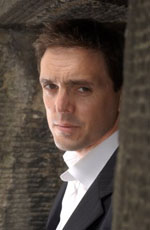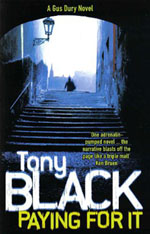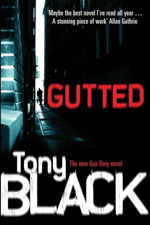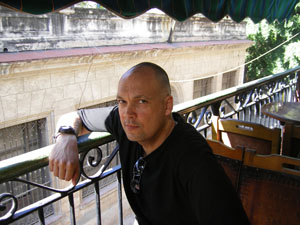- Welcome
- Noir Zine
- Allan Guthrie
- Books
"...those who enjoy the darker side of the genre are in for some serious thrills with this..."
Laura Wilson, The Guardian

Published in the UK by Polygon (March 19th, '09) and in the US by Houghton Mifflin Harcourt (Nov '09).
Tony Black
by Nick Stone
 Tony Black (pictured right) is the author of Paying For It (2008) and the recently published, Gutted. Both are superb books, and come highly recommended. If anything, Gutted just edges the debut in the quality stakes. But that's just my opinion.
Tony Black (pictured right) is the author of Paying For It (2008) and the recently published, Gutted. Both are superb books, and come highly recommended. If anything, Gutted just edges the debut in the quality stakes. But that's just my opinion.
Tony very kindly agreed to take five minutes off writing his latest novel, Loss - the third in the Gus Dury series - to answer some questions.
Nick Stone: Your character in Gutted is an alcoholic journo. You pulled it off superbly. You never get the feeling that the guy's too pissed to think, let alone act. Do you think there are too many alcoholics in crime fiction?
Tony Black: Well, thanks for that ... Everyone thinks I'm a meeting-a-day alky; which I'm not by the way, actually I'm tee-total. Would love to have Richard Burton's liver but never mind...
I describe Gus Dury, my main character, as a reluctant PI and enthusiastic alky ... the 'too pissed to think' state, is actually what he's after - he can't handle reality. The world's changed so fast it's left him behind and so he's trapped in an abusive past that's left him too scarred to function. The sauce is his anaesthetic; it helps him get his boots on in the morning.
The drunken PI is a bit of a staple in crime fiction; it can be cookie-cutter characterisation when it's done badly, but if it's done well I find it gripping. I think the dissolute and damaged seeking solace in the bottle can be tragic and heartbreaking. It's that way in life, look at Besty, look at Jim Morrison ... huge talents sacrificed to the bottle. I'm fascinated by these types, y'know, the ones that are on the surface, super-human, but underneath are actually all too human. The flaws, the contradictions ... great conflict for an author.
NS: What made you stop drinking?
TB: No big reason ... just grew out of it. You can get away with rattling out of clubs at 3am every other night of the week when you're in your twenties. In your thirties it just looks sad.
NS: Why did you make your main character a journalist?
 TB: To be honest, I didn't give it that much thought. I didn't want Gus Dury to be ex-military or a fallen cop, and the out-and-out PI is hard to pull off outside of the classic era ... but Gus had to have some qualification for the investigative work though, so that's why I made him a former investigative reporter who's watched his trade turn to shit - I know how he feels!
TB: To be honest, I didn't give it that much thought. I didn't want Gus Dury to be ex-military or a fallen cop, and the out-and-out PI is hard to pull off outside of the classic era ... but Gus had to have some qualification for the investigative work though, so that's why I made him a former investigative reporter who's watched his trade turn to shit - I know how he feels!
NS: Do expand on the last point.
TB: When good journalists are crossing the border to PR, the game has seriously gone to shit. The bottom line has become all important and standards of journalism everywhere have vanished ... the bean-counters are out of control and staff have been decimated. There are (what were once) good papers being put out now by work-experience ‘staff’ and the largesse of over-worked hacks; the industry is a shadow of its former self. None of the tossers in charge know what they're doing – they're not journalists - and they're doing a grand job of driving the rig into the wall. I love to meet the cockhead that thought of giving away copy on the internet (in some cases before hard copy publication) ... that proved to be another great idea. Rant over, before I start on them doing away with subs ... see, I’m nothing like Dury!
NS: What comes first to you? Character or plot? And do you get your plots fully formed or are they kernels you plant and let blossom and sprout and creep where they will? And your characters - how do you build them? Soul to clothes, or clothes to soul?
TB: It's always character; reading or writing I always go to character first. Plots don't come fully formed to me, bloody hell, that how you get them? I feel inadequate now ... no, I have a loose idea, a setting maybe or a character in a certain situation and I'll build layers from that. It's the Sarah Lee principle - layer upon layer upon layer.
Characters are a funny thing. I kind of grab odd bits of people from real life like traits, appearance, vocab ... they all meld together. Like I say I'm big on character so I like to flesh them out. I'll quite often put in a minor character and go back and colour him in a wee bit, y'know, give him a nickname or if he's a twat an interest in The Proclaimers.
NS: Which writer/writers prompted you to write crime fiction?
TB: I'm probably as far from the typical fan of the genre as you can get; I don't read that much crime fiction to be honest. I can't get into police procedurals or truck-stop thrillers. I'm much more attached to Noir, in all its guises. I love Ken Bruen. He was probably the man who got me into this crime stuff ... I loved Rilke on Black when I first read it. It was one of those real eye-opener moments for me, up there with reading A Farewell to Arms or Treasure Island when I was a kid. It made me think, 'wow ... you can do this?'
Irvine Welsh, though he isn't classed a crime writer, his work skates around the edges for sure, is a huge influence on my work. I loved The Acid House, which I read at university, just before I dropped out. It seemed to render everything that had come before it utterly meaningless ... Marabou Stork Nightmares is one of my all-time favourite novels too. Filth is a dirty piss-take of the police procedural which had me roaring with laughter throughout. Guy's a genius.
I particularly love Filth. You can pick a killer line on every page of that work. I love the fact that Welsh got away with creating a completely unsympathetic protagonist (Robbo) too ... I interviewed him a while back and asked if he had anyone at his publishers try to make Robbo a bit nicer and he said, ‘No’ ... like you'd tell Irvine Welsh how to write! Apparently, he got lifted once after a footie match and when he was getting turned out the cells in the morning there was a row of cops waiting. He thought he was for a booting, but they all produced copies of Filth for him to sign.
NS: Why did you drop out of college?
TB: I was studying English Lit at Uni and to be honest the pretentiousness of it all shitted me; I hated seeing these fuckers sitting around in ex-army greatcoats and John Lennon glasses pontificating about meta-narratives and intertextuality ... it all seemed like wank to me. Have never got along with academic labels. Those who can do, those who can't teach.
Then there was the full-on social life, I really fucked up in my final year because I had my grant cheque spent within a month. Anyway shit happens, can't say it's held me back.
NS: How easy was it for you to get published?
TB: I was writing for about seven years, coming in from work and sitting in front of the PC, before I got a deal. I wrote four unpublished novels before Paying For It sold. The books had a lot of agent interest, I was signed in the UK and US to agents but, despite coming close a few times, they never sold. Those early books weren't crime, though, soon as I turned to crime fiction I sold very quickly, matter of weeks.
NS: How do you write? Pen, computer, typewriter, dictaphone, hanging upside down in magnetic boots, on your feet, sitting down? How many hours a day do you put in? Do you have a word quota?
 TB: I wrote my first book longhand and thought ... never again. It was never published but landed me an agent. I fire the lot straight into the laptop now, usually, if I’m out my kip in time, mornings. I do work to word counts – I'm a trained hack, c'mon - and they vary. For Gutted they were about 2k a day but for Loss I was running behind and upped the game to 5k. I've been known to double the words if I fall behind, which happens. For Loss I was working pretty rigid hours too, almost 9-5, which I didn't have the luxury to do before.
TB: I wrote my first book longhand and thought ... never again. It was never published but landed me an agent. I fire the lot straight into the laptop now, usually, if I’m out my kip in time, mornings. I do work to word counts – I'm a trained hack, c'mon - and they vary. For Gutted they were about 2k a day but for Loss I was running behind and upped the game to 5k. I've been known to double the words if I fall behind, which happens. For Loss I was working pretty rigid hours too, almost 9-5, which I didn't have the luxury to do before.
NS: You've referred to yourself as "a trained hack". What did said training in hackdom involve, and how was it beneficial to you, vis a vis the writing process?
TB: The writing can be both a victim of and beneficiary of any hackwork. Hemingway famously said it can be good for a writer to be a hack for a while, but they have to get out before it ruins them for anything else. I know what he means. I couldn't go back to the 9-5 and then coming home at night to work on another thousand words for a novel ... On a simple sense the journalism taught me to have no fear of deadlines or word counts, to get those words down on the page and to consistently motivate yourself. What I got out of late-night death knocks and interviewing the B-list celebs is less easy to trace, though I still can't watch Celeb BB.
NS: Do you think writing can be taught?
TB: No, I don't. But that doesn't stop a whole industry springing up around just that, though. My agent tells me some of the worst submissions she gets are from creative writing graduates and I know for sure the ones we get at Pulp Pusher which start 'I'm a graduate of XYZ writing course' are invariably followed by a pile of wank. I'm back to Hemingway again, but he said, no-one that could write ever had to teach writing. I totally agree, it's a solitary affair, you have to find your own way, no-one can guide you to self-expression.
NS: Edinburgh or Glasgow? And why.
TB: I'm a fan of both ... both are totally different. I saw Edwyn Collins, who's from Edinburgh, on the telly a while back say he actually preferred Glasgow – it's a tough call. Glasgow has that whole Irish influence going for it which creates some great craic ... Glasgow patter is fantastic and I love writers that utilise it, folk like John Byrne, though I know he's a Paisley buddie, I always think of his writing as Glasgow.
Edinburgh is more cosmopolitan, much more multicultural, and I love those influences. You feel part of a wider international community in Edinburgh whereas Glasgow's identity is much more rooted in its Scottishness, I feel. You can taste the history in the capital city as well. I went to a reading by Ian Hamilton (guy who reclaimed the Stone of Destiny in the 1950s) in Edinburgh’s Old Town the other night and someone remarked you couldn't imagine a better setting for the occasion and they were absolutely right.
NS: Marcel Berlins wrote a great review of Gutted in The Times, where he added you to the burgeoning Scottish crime lit scene. Does that sort of acclaim go to your head or do you think "Cheers, better than a kick in the nuts, mate" and get on with things?
TB: Haha ... the latter definitely. I don't register the praise at all, and I don't mean to sound dismissive of it, grateful as I am, but if you grow up in Scotland you're far more used to being criticised by authority figures. We're not big on confidence building here. In a lot of ways we're the antithesis of the Americans. I remember when I did my Highers – that's A-levels to you - and I told my old man I got an A, B and a C ... his reaction was, ‘How the hell did you get a C?’ I don't think he ever mentioned the A, not out of any malice but that's how we are - praise is an alien concept to Scots. I wish it wasn't that way. We've got much to be proud of. Unfortunately we tend to only appreciate our achievements 100 years or so down the track.
NS: You feature illegal dog fighting in Gutted. Did you do much research into it, or just make it up? In fact, are you one for meticulous research at all?
TB: I did some research. Not to the point of actually infiltrating a dog-fighting ring, though, wouldn't need to. Where I stay you see them training them at the park. It's a big problem here, and badger baiting. I'm a huge animal lover and it sickens me to the gut to see any animal abused in any way. It's an axiom that there's no bad dogs, only bad owners.
NS: Series or standalone?
TB: I'm contracted for another four books and I've got the nod to do some standalones in there, so we'll see. I have another Dury, called Loss which is out next February, and after that I've got one more mapped out called Long Time Dead, but there may be a standalone sandwiched between them. We'll see …
NS: Tell me about your website, Pulp Pusher.
TB: It's a webzine which I kinda fell into doing by accident and we've managed, with the help of lots of unpaid contributors, to keep going for a couple of years now. Never ceases to amaze me the quality of the stuff we get; I've put up tales by several authors, and we've featured Ken Bruen, Irvine Welsh and Ian Rankin. All down to the enthusiasm of the contributors I add again, and, of course, the writers who generously got involved.
NS: Do you have Kindle?
TB: Shit no, way too much of a technophobe. Al Guthrie's a big fan of that kinda thing and he's almost got me sold on the idea but I can still remember the Psion 5MX and think, they could get all that in there and this thing only holds books! Go way.
Thanks for your time, Tony. Good luck with it!
TB: Thanks back, was a blast.
###
This interview first appeared on Nick Stone's Stoneblog
Click here to read Tony Black interviewing Nick Stone

NICK STONE is the author of Mr Clarinet, King of Swords and a forthcoming sequel to both, set in Miami and Cuba in 2008.
